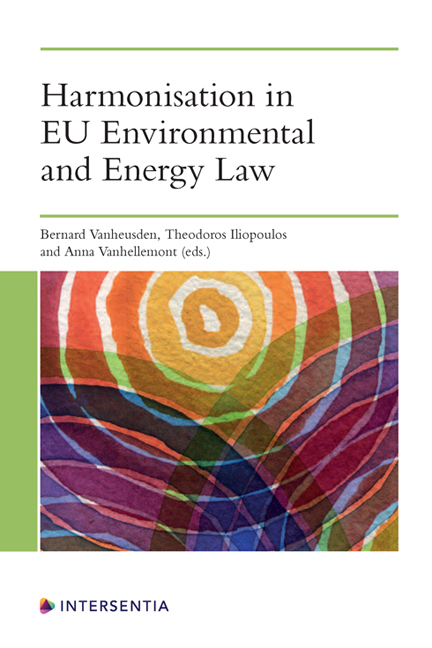Introduction
Published online by Cambridge University Press: 26 May 2022
Summary
Following the 2019 conference titled ‘Harmonisation in environmental and energy law’, 13 contributors offer a unique perspective on the topic of harmonisation from their fields of expertise. With a critical mindset, the authors discuss a variety of issues reaching from more general harmonisation concepts and processes to harmonising specific pieces of environmental and energy law. Throughout the book, an overview of the current state of the law is supplemented with a look into the future, proposing ways forward and presenting different harmonising solutions for the problems raised.
THE 2019 CONFERENCE
Within the context of celebrating its 10th anniversary, the Law Faculty of Hasselt University, together with several other Belgian universities and the European Environmental Law Forum, organised an international conference on harmonisation in environmental and energy law, which took place on 28 and 29 March 2019. The conference was chaired by Professor Bernard Vanheusden. During two very rewarding days, the Environmental Law Unit of the Research Centre for Government and Law (CORe) was pleased to host around 70 academics, practitioners and policy-makers from all over Europe. This book contains the written account of several of the thought-provoking presentations of the 2019 conference. However, current developments that have emerged since then were also incorporated into the contributions.
Environmental legislation is often incoherent and fragmented, causing hurdles to its application and enforcement. In this regard, rule-makers resort to harmonisation. Harmonisation is seen as referring to a number of techniques and instruments that all aim to clarify rules and create a more coherent and solid legal framework. The main aim of the conference was to examine the merits of harmonisation – without overlooking potential problems – and ask critical questions to spur fundamental discussions. The rather broad topic of harmonisation in environmental and energy law was selected because it fits with research currently being conducted in the Environmental Law Unit on internal harmonisation of environmental law, considering, for example, the possibility of an EU Environmental Code.
Besides five keynote speeches from renowned academics and the Director- General of the Directorate-General (DG) for the Environment of the European Commission, 33 other researchers in the field of environmental and energy law shared their findings during five parallel sessions.
- Type
- Chapter
- Information
- Harmonisation in EU Environmental and Energy Law , pp. 1 - 6Publisher: IntersentiaPrint publication year: 2022



